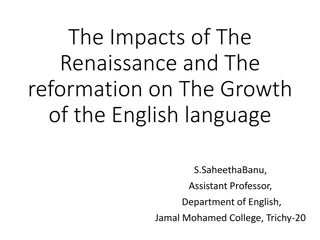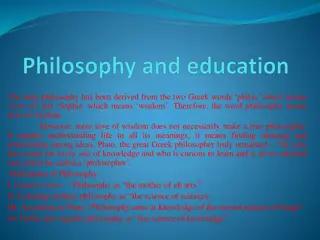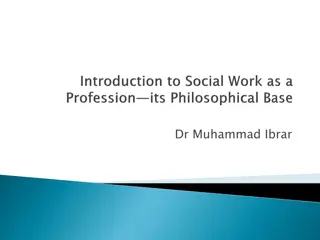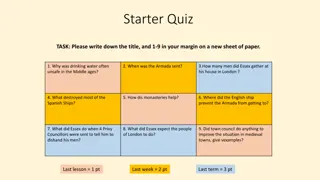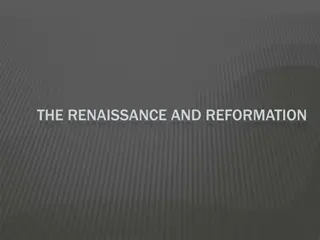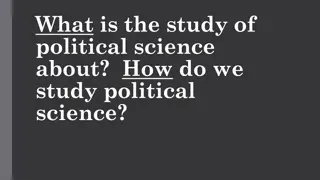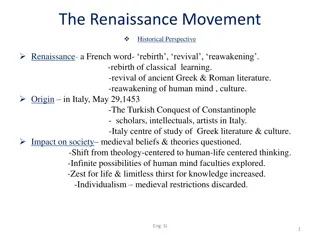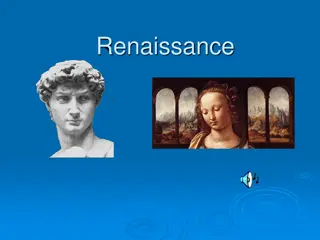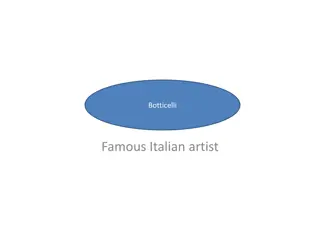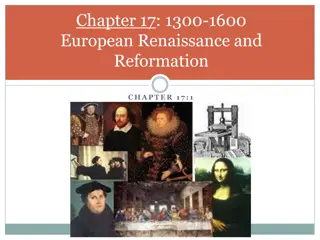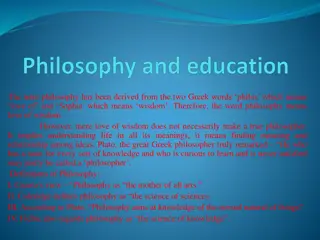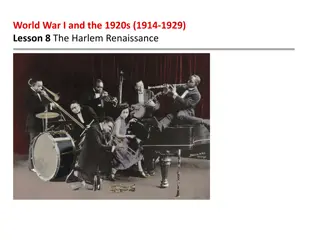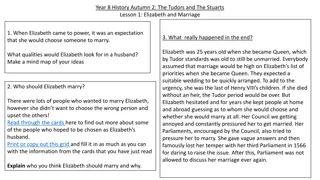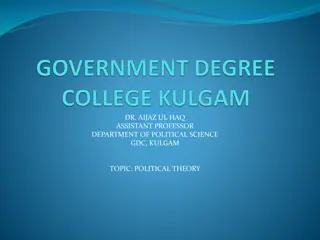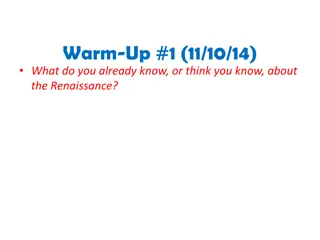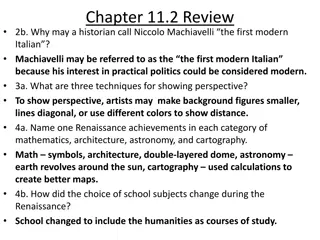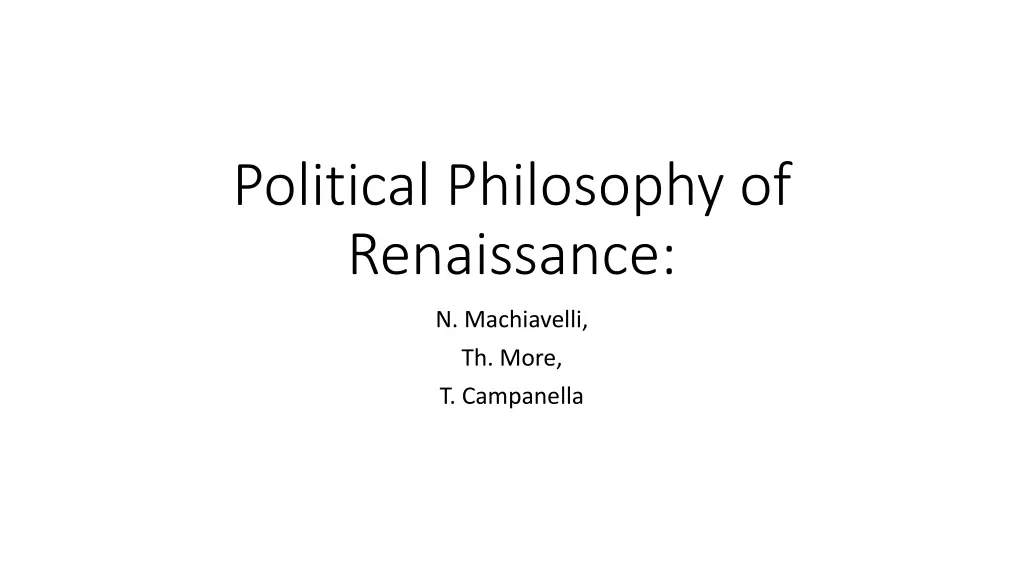
Renaissance Political Philosophy Overview
Explore the political philosophy of the Renaissance era, discussing key figures like Machiavelli, More, and Campanella. Learn about the impact of humanism, secularization, and the rise of scientific centers, as well as the changing perspectives on morality and politics. Discover how thinkers like Giordano Bruno and Thomas More faced persecution for their beliefs, and delve into Machiavelli's views on governance and statecraft.
Uploaded on | 1 Views
Download Presentation

Please find below an Image/Link to download the presentation.
The content on the website is provided AS IS for your information and personal use only. It may not be sold, licensed, or shared on other websites without obtaining consent from the author. If you encounter any issues during the download, it is possible that the publisher has removed the file from their server.
You are allowed to download the files provided on this website for personal or commercial use, subject to the condition that they are used lawfully. All files are the property of their respective owners.
The content on the website is provided AS IS for your information and personal use only. It may not be sold, licensed, or shared on other websites without obtaining consent from the author.
E N D
Presentation Transcript
Political Philosophy of Renaissance: N. Machiavelli, Th. More, T. Campanella
Renaissance 14 16/17 c AD; had a dramatic impact on further global development; The fall of Byzantium; Secularization begins; Humanism and anthropocentrism; Humanism: socio-philosophical movement that viewed human /mankind with freedom, creativity, and life as central values Social classes that were out of feudal system: artisans, bankers, merchants.
Renaissance Appearance of the secular-type of scientific and cultural centers in the cities; 15 c.- book printing in Europe; Attention to antiquity; Studies of the human body/anatomy;
HUMANISM AND RENAISSANCE HUMANISM AND RENAISSANCE - A direct relationship with the classics (in polemics with Medieval interpretations) - The centrality of Man though God is still fundamental - A new interest in the study of nature - The relationship between morality and politics (Machiavelli, Bodin)
HUMANISM AND RENAISSANCE: science HUMANISM AND RENAISSANCE: science - From a closed world to the infinite space: Copernicus (1543) the Hearth is rotating around the Sun, Bacon (1561- 1626) and the concept of experiment, Galilei (1564-1642) the telescope and the infinite universe. - But also the Inquisition
Giordano Bruno Giordano Bruno burned alive Thomas More burned alive Thomas More decapitated decapitated
NICCOL NICCOL MACHIAVELLI MACHIAVELLI (1469 (1469- -1527) 1527)
NICCOL NICCOL MACHIAVELLI MACHIAVELLI - The Highest Good: A free and well ordered state - The need for stability in a prince s principality: at stake is its preservation - The state has no transcendent justification: it is an instrument for common good church and the state - The art of the state: political techniques of extreme realism - Virt : no moral connotation virtuous are those qualities and attitudes that contribute to the success of the prince moral vice can well be a political virtue (for example, cruelty) - Prudence: considering not only the short period, but the long period as well separation between the a
NICCOL NICCOL MACHIAVELLI MACHIAVELLI Commonly it is said that in Machiavelli there is no moral basis on which to judge the difference between legitimate and illegitimate uses of power. Is it true? Perhaps there are two different kind of morality: one for common citizens (as private individuals) and another one for rulers Flexible Disposition: varying her/his conduct from good to evil and back again as fortune and circumstances dictate
THE PRINCE THE PRINCE Reputation a prince may be perceived to be merciful, faithful, humane, frank, and religious, but he should only seem to have these qualities. A prince cannot truly have these qualities because at times it is necessary to act against them. Although a bad reputation should be avoided, this is not crucial in maintaining power. The only ethic that matters is one that is beneficial to the prince in dealing with the concerns of his state.
THE PRINCE THE PRINCE Generosity Being over-generous is not economical, because eventually all resources will be exhausted. This results in higher taxes and will bring grief upon the prince. Then, if he decides to discontinue or limit his generosity, he will be labeled as a miser. Guarding against the people s hatred is more important than building up a reputation for generosity. A wise prince should be more willing to be reputed a miser than be hated for trying to be too generous
THE PRINCE THE PRINCE Cruelty and mercy The answer is of course, that it would be best to be both loved and feared. But since the two rarely come together, anyone compelled to choose will find greater security in being feared than in being loved. - do not interfere with the property of the subjects, their women, or the life of somebody without proper justification. - Regarding the troops of the prince, fear is absolutely necessary to keep a large garrison united and a prince should not mind the thought of cruelty in that regard
NICCOL NICCOL MACHIAVELLI MACHIAVELLI Authority and power are essentially coequal: whoever has power has the right to command The only real concern of the political ruler is the acquisition and maintenance of power Since there cannot be good laws without good arms, I will not consider laws but speak of arms
NICCOL NICCOL MACHIAVELLI MACHIAVELLI Legitimacy of law rests entirely upon the threat of coercive force; authority is impossible for Machiavelli as a right apart from the power to enforce it. Consequently, Machiavelli is led to conclude that fear is always preferable to affection in subjects, just as violence and deception are superior to legality in effectively controlling them
THE PRINCE THE PRINCE Armies and Troops - Strong military forces (and if you can not raise such an army make fortifications and defend your city) - Don t use mercenaries: are undisciplined, cowardly, and without any loyalty, being motivated only by money - Don t use auxiliary armies, borrowed from an ally, they are even worst than mercenaries: because if they win, the employer is under their favor and if they lose, he is ruined - Si vis pacem para bellum Qui desiderat pacem, praeparet bellum . (Vegetius: " , ".
Thomas More (1478 Thomas More (1478- -1535) 1535) 1529 Chancellor of England 1535 Decapitated because he refused to recognize the divorce between Henry VIII and Catherina of Aragon and the act of supremacy declaring the King as the head of the English Church; UTOPIA : a place where everyone is happy
Thomas More (1478 Thomas More (1478- -1535) 1535) 1529 Chancellor of England 1535 Decapitated because he refused to recognize the divorce between Henry VIII and Catherina of Aragon and the act of supremacy declaring the King as the head of the English Church
Thomas More (1478 Thomas More (1478- -1535) 1535) UTOPIA (ou-topos [no place], eu-topos [good place] ) The work begins with some letters between Saint Thomas More and a couple of real people he met on the continent
Thomas More (1478 Thomas More (1478- -1535) 1535) Book 2: Discourse on Utopia -No private ownership in Utopia, with goods being stored in warehouses and people requesting what they need. - The houses are rotated between the citizens every ten years. - Agriculture is the most important job on the island. Every person is taught it and must live in the countryside, farming, for two years at a time, with women doing the same work as men. Parallel to this, every citizen must learn at least one of the other essential trades
Book 2: Discourse on Utopia Book 2: Discourse on Utopia - All people wear the same types of simple clothes - All able-bodied citizens must work; thus unemployment is eradicated, and the length of the working day can be minimized: the people only have to work six hours a day (although many willingly work for longer)
Thomas More (1478 Thomas More (1478- -1535) 1535) - Slavery is a feature of Utopian life and it is reported that every household has two slaves. The slaves are either from other countries or are the Utopian criminals. Slaves are periodically released for good behavior. - A welfare state with free hospitals - Euthanasia encouraged by the state - Priests being allowed to marry - Divorce permitted, but premarital sex punished by a lifetime of enforced celibacy and adultery being punished by enslavement. - Travel on the island is only permitted with an internal passport and anyone found without a passport they are, on a first occasion, returned in disgrace, but after a second offence they are placed into slavery. - No lawyers and the law is made deliberately simple, as all should understand it and not leave people in any doubt of what is right and wrong.
Thomas More (1478 Thomas More (1478- -1535) 1535) Religious Toleration: There are several religions on the island but each is tolerant of the others. BUT atheists are despised in Utopia, as they are seen as representing a danger to the state
Tomasso Campanella Tomasso Campanella Campanella was born in Stilo, Calabria, on September 5, 1568. Joined the Dominican order at 14 years old to study the philosophy of Aristotle. Was influenced by Plato s views; But soon displayed Anti- Aristotelian tendencies.
T. Campanella: The City of Sun ( Solaria lat.) - commune ; - A perfect generation if its citizens (Eugenics); - Family and private property (**); - obligation to work; - No slavery; - Why is the Sun City distant from Europe? - The government of Solaria*** - Metaphysic ( ) and the Priests
Seminar N. Machiavelli: The Prince 1. What is better for the ruler: to be mean or generous? 2. What was, according to Machiavelli, better for the ruler - to be loved or to be feared? Why? 3. Was it important to keep faith for the ruler? 4. What did the author say about hatred and a ruler? 5. What is fortune for a ruler?

